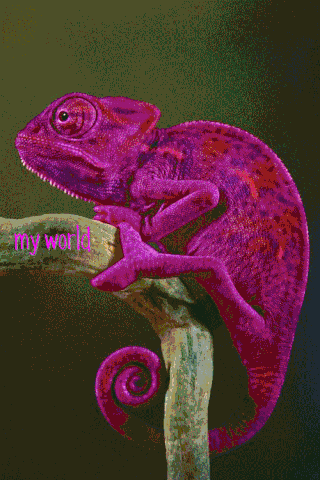Chameleons DON'T actually change colours to match their surroundings
Perhaps its the bright blue and orange foliage and trees that we are surrounded by that make us think that chameleons use their amazing colour changing ability to blend in??
OK, sarcasm is not a sign of mental strength, but this should have been realized (by myself) before actually reading about it.
I mean they change to some amazingly brilliant colours, and not a dull brown or sandy green colour.....duh!
Nope these brilliant little creatures in fact rely on their resting state as the camo state, and don't usually change so that they can better blend into the background of their environment.
In fact the resting colours are often the best camouflaged set of colours in their arsenal, as far as hiding is concerned.
That and the leaf walk that they are famous for.
Anyway, they are cool little animals, and get quite used to their humans quickly enough to shoot their javelin tongues off to catch a fly or insect on your hand after a short while.
So why the colour changing then?
There are actually 2 main reasons that they do the colour changing, and these are to regulate their temperatures, and to signal intentions to other chameleons.
Regulating the temperature: remember that these animals cant generate their own body heat, so a great way to control the temperature of the body is to change it to the colour best suited to their needs.
If they are hot, they can turn pale in order to reflect the suns heat and if they need to warm up, a darker colour will absorb more of the heat from the sun.Communication: Male chameleons turn a bright colour when they need to communicate their dominance and interest in a female.
They also turn dark when they are aggressive and are encountering a fellow male.
Females also change their colours to indicate if they are ready to mate or not. I had to laugh, can you imagine if the human race had similar signals to the internal intentions of the interested parties? LOL!! No need for disco lights at a club, just let them loose!
So back to the chameleons, the colour changes are a great way to know what mood the little chap/lady is in.
How do they do it?
The outer layer of a chameleons skin is in fact transparent. Below that layer are other layers of skin that contain cells called chromatophores.
These chromatophores are filled with sacs of different kinds of pigment, and the deepest layers contain melanophores which are filled with the same pigment that gives humans its many shades.....melanin.
The next layer above that are the cells that contain iridophores. These give the blue pigment that reflects blue and white light.
On top of that layer is the the cells with xanthophores and erythrophores, which contain the yellow and red pigments.
By expanding or contracting those relative cells, the pigments that are connected to those layers of cells are released and changes the colours of the cells.
This is what was believed to be the only way they change the colours, but recently another discovery has found that they have another way of changing colours so quickly.
Photonic nanocrystals are the other way they get to change their colours so quickly and beautifully, and the way they use these nanocrystals is through iridophores.
These are cells that manipulate colour totally differently to 'sacs of colour'.
They in fact change the geometry of the cells, changing the way the skin then reacts to the light coming off of it.
It will reflect the light according to how the cells are made up, reflecting only the colours we see.
When the scientists studied the chameleons they noticed that the spacing on the upper layers of skin were latticed in a very precise formation and spacing.
As the chameleon was changing c=shape, the spacing between the guanine crystals on the skin would change size from its resting state, thus interacting with the light in different ways each time they were changed.
"Each color of visible light has a different wavelength – blues are on the short end, and reds are on the long end (with the other colors arranged in between). So when the guanine crystals have short spaces between them, they reflect the bluer wavelengths. When the crystals are spaced farther apart, they reflect the longer wavelengths – more red wavelengths." - Credit
Now if you combine that ability with the ability to change the pigment sacs, you have the ability to create shapes and colours that amaze and communicate.
















I never knew that. The way that a chameleon changes color sounds similar to the way that e-book readers work -- with different pigments being shifted around to create a different visual effect.
🎗 Announcing SteemBeem DAPP ⚡ Give It A Try, Best Is Yet To Come!
Or even TV's. Wonder if the idea for the screens came from the discoveries made on creatures like this?
Little lights changing colour according to the programmed language inputs....clever and effective
Consider my mind blown with this myth busted! All I can think of now is Cuma cuma cuma cuma chameleon! Lol dammit now to spent the next few hours getting that tune out of my head
Posted using Partiko iOS
LOL!!! I didnt hear it once while writing the post, and now...its over...the rest of the day Im gonna have it playing in the head :)
Haha! howdy sir towjam! that is amazing, I thought they changed colors to match their surroundings!
This is a great post and the photos are stunning!
Thanks once again mate! I love those little critters. They really are cute and fascinating to watch
I don't know if we have them in Texas, do you guys have them there?
We do...because they're such cool pets they have set a law not to have as pets because everyone was grabbing them and they were dying out.
Cool little things
oh, I was just going to say it would be fun to have one as a pet! But I guess that doesn't work out too well
unfortunately.